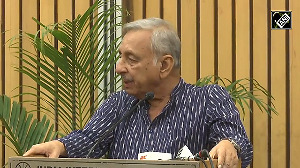 After the Mini Budget early this month, the government on Wednesday came out with the Mini Exim Policy that allows free import of gold, silver and electrical energy, and liberalises exports of certain fertilisers.
After the Mini Budget early this month, the government on Wednesday came out with the Mini Exim Policy that allows free import of gold, silver and electrical energy, and liberalises exports of certain fertilisers.
Announcing the policy measures in New Delhi, Commerce Minister Arun Jaitley said that imports of all kinds of capital goods, including office and professional equipment, would be allowed under duty free entitlement scheme.
But imports of agriculture and dairy products and cars would continue to be banned, he said, adding that heritage hotels, I-star and II-star hotels and stand-alone restaurants would be extended the benefits of duty-free import now admissible to the tourism sector.
Capital goods have been removed from Duty Entitlement Passbook Scheme.
Jaitley, however, maintained that these announcements were only 'procedural changes' that are being demanded by the exporters as a follow up to last year's Exim Policy.
It would be left to the new government to present the full-fledged Exim Policy.
The minister also announced that the exports recorded an 'unprecedented' 42.68 per cent growth in December 2003, pushing up the overall growth in the first nine months of this fiscal to 13.48 per cent.
The benefit of duty-free imports to hotels would be allowed only if they pass them on to the customers.
To promote export-related infrastructure, rupee payments received for port handling services would be counted for discharge of export obligations under the EPCG scheme.
To boost R&D activity, import of prototypes would be allowed to actual users without any limit. At present, the list is restricted to 10 per annum.
The policy envisages that the ceiling of export of gifts abroad be raised from one lakh a year to Rs 5 lakh (Rs 500,000).
To accelerate incremental growth rate of exports and enable India to emerge as a manufacturing hub, the government said that it has increased its focus on procedural simplification by introducing e-commerce initiatives like digital signature, electronic fund transfer and message exchange.
"All these will not only reduce transaction costs for the exporting community but also impart greater transparency and reduce the discretion while availing various benefits under the Exim Policy," Jaitley said.
To offset high power costs faced by manufacturing industry, duty-free fuel would be allowed with actual user conditions under Duty Free Replenishment Certificate scheme.
The minister said advance licence for intermediate goods would be allowed against DFRC scheme and the sensitive list under the DFRC scheme has been pruned with downward revision of customs duties.






 © 2025
© 2025